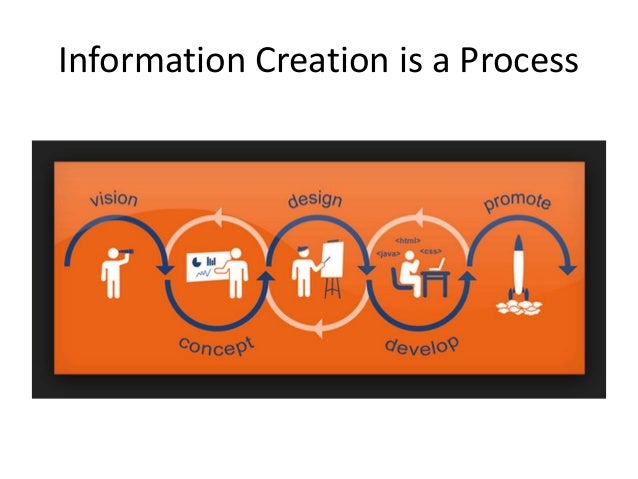 http://image.slidesharecdn.com/acrlinfolitstandardsppt-150330172730-conversion-gate01/95/acrls-new-information-literacy-standards-5-638.jpg?cb=1427736530
http://image.slidesharecdn.com/acrlinfolitstandardsppt-150330172730-conversion-gate01/95/acrls-new-information-literacy-standards-5-638.jpg?cb=1427736530This Frame refers to the fact that the purpose, message and delivery of information are intentional acts of creation. The usefulness of information are determined by the process of creating that information as well as the final product. Information is published and distributed in a variety of formats. Each source of information have constraints and limitations. Information in its various formats may be useful in different ways and not all the formats have the same level of Authority. They can however contribute to scholarly conversations. Different formats are created differently and students need to understand the purpose and processes behind the creation of these formats as well as how and when to use it
Assignment
Use your research topic and do a thorough search for information on the topic. Gather as many formats as possible. Select the formats that you feel would meet your research expectations. Explain why you chose those formats. Secondly, transform at least two of those formats into another source type.
Journal Articles
Walker, M. 2005, "Rainbow nation or new racism? Theorizing race and identity formation in South African higher education", Race, Ethnicity & Education, vol. 8, no. 2, pp. 129-146.
MEKOA, I. (2011). Discourses and politics of racism in higher education in South Africa. Africa Insight. 40, 104-120.
Audio-visual Material
https://www.youtube.com/watch?v=sF3rTBQTQk4&feature=youtu.be
https://www.youtube.com/watch?v=r_a-q36mFzM
Printed Books
Johnson, J.D.2009.Knowledge in the Blood: Confronting Race and the Apartheid Past. Juta and Company Ltd: South Africa
Ahmed, S. 2012.On Being Included: Racism and Diversity in Institutional Life. Duke University Press: North Carolina
Newspaper articles
http://www.bdlive.co.za/national/education/2015/08/25/state-has-plan-to-fight-racism-at-universities
http://www.thenewage.co.za/169133-1007-53Stellenbosch_University_VC_admits_to_racism_at_the_institution
The reasons I chose these particular format is that the journal are all peer reviewed, The audio-visual material gives us a first person narrative of their life under apartheid on a university campus. The books give background information to the problem and the newspaper articles gives us an up to date view and information concerning the problem.
Topic
An investigation on racism between first year UWC students.1. Journal Article.
http:roxy.uwc.ac.za/webx/access/electronic_journals/afrins/afrins_v40_n4_a9.pdf
Transformed to:
Powerpoint Presentation
<iframe src="https://docs.google.com/presentation/d/1HyvvySE3ECF-XXrgPZPrdxROn6nqc7vuP3H-Pyzr0N8/embed?start=false&loop=false&delayms=3000" frameborder="0" width="960" height="749" allowfullscreen="true" mozallowfullscreen="true" webkitallowfullscreen="true"></iframe>https://docs.google.com/presentation/d/1HyvvySE3ECF-XXrgPZPrdxROn6nqc7vuP3H-Pyzr0N8/pub?start=false&loop=false&delayms=3000
2.Youtube Video
Luister
Transformed to:
Article
Luister is a documentary about the lives of students of colour who attend Stellenbosch University, a South African institution of higher learning. In a series of interviews, students recount instances of racial prejudice that they continue to experience in the town of Stellenbosch, and the enormous challenges that they face due to the use of Afrikaans as a language of teaching at the university. Luister is a film about Afrikaans as a language and a culture. It is a film about the continuing racism that exists within a divided society. It is a film about a group of students whose stories have been ignored. Luister is the Afrikaans word for Listen


